 About GamePeople
About GamePeople
Subscribe to the Soulful Gamer column:![]() RSS or
RSS or
![]() Newsletter.
Newsletter.
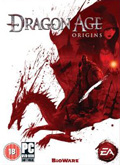
Format:
PC
Genre:
Adventuring
Style:
Singleplayer
Thirdperson
Buy/Support:
Support Adam, click to buy via us...
Other GamePeople columnists have reviewed this from their perspective - huh?:
Soundtrack Gamer (OST)
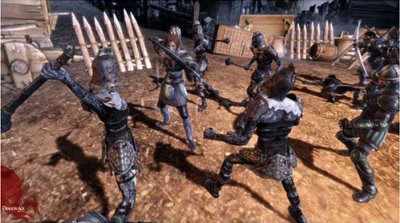
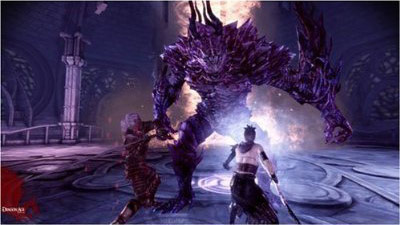
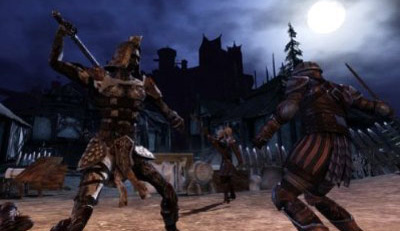
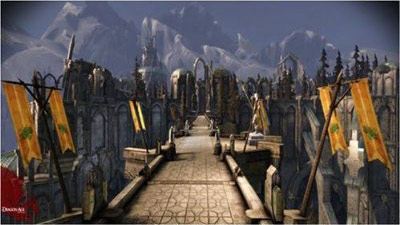

As a spiritual successor to Baldur's Gate 2, Dragon Age: Origins is an epic role-playing fantasy game that successfully blends the charm of an old-school RPG storyline with some sophisticated relationship and dialogue mechanics. It doesn't reinvent the Western Role-playing genre, but its presentation of a dark fantasy world with meaningful choices and grim consequences show that traditional Tolkien-inspired games have plenty left to offer the modern video game player.
The traditional Western Role-playing game has been well-represented in recent years, with The Elder Scrolls: Oblivion offering some impressive open-world adventuring in a typical fantasy setting whilst Mass Effect brought Bioware's RPG expertise into the realm of science-fiction space opera. Dragon Age: Origins, also developed by Bioware, is pretty much the most traditional and typical fantasy RPG you could wish for and follows the company's success in developing the Dungeons and Dragons-based Baldur's Gate series and the original NeverWinter Nights.
On the surface it would be easy to criticise Dragon Age for being nothing more than the epitome of the genre. But delve beneath the Tolkien-inspired fiction and the MMO-style interface and you'll find a game that's laced with knowing sarcasm but also serious enough to offer some believable dark themes. This is Bioware at their best and the over-arching narrative kept me constantly involved and itching to take on the next quest.
These origin stories gave me a real sense of where the character I was playing came from, what their history was, and how they and their race fitted into the world.
Though the class system of Dragon Age may be a little restrictive than what I've been used to when playing an RPG, it more than makes up for this with the six origin stories which offer unique, 1-2 hour beginning sections depending on which race or class you choose. These origin stories gave me a real sense of where the character I was playing came from, what their history was, and how they and their race fitted into the world. For example, choosing a Dalish Elf will put you in a small campaign deep in the Brecilian forest. Here the story focuses more on the forgotten Elvish culture and how your small community survives as a nomadic people.
Survival for my main character, a City Elf, was a very different matter. The Elves living in Denerim, Ferelden's capital, are subjected to prejudice, segregation and racism on a daily basis - all of which spills over during the Origin story that shows or implies the brutal treatment that your family and friends are subjected to. The dark themes continue and out of the six Origin stories, those of the City Elf and lower caste Dwarf are the most affecting. Maybe I've played too many generic games that put Elves above humans in stature and culture, but having these genre tropes turned on their head and giving Elves a history of enslavement is just one aspect of Dragon Age that elevates it above the usual fantasy shtick.
Half of the experience and enjoyment comes from forging relationships with the variety of characters that you'll meet and recruit into your team.
The manner with which these origins stories bleed into much of the main game gave me the kind of meaningful experience I've long been waiting for in Western RPGs. The one instance where this struck home came when I returned to the Alienage much later in the game - finding out that the poverty-stricken and grimy streets of my home had actually become worse thanks to my actions earlier in the game was one of many depressing story moments.
Many of the other origins stories intersect the main quest and itís only after playing through all six does the depth to the game become apparent. Initially I was skeptical about this approach working to enrich the experience - but being presented with six vastly different beginnings rather than six unique endings actually made a great deal of sense. There's no way I can complete Dragon Age six times without going mad, but spending four hours or so with all the Origin stories is a much quicker and interesting way of building a depth that's much more accessible to more players. I know I experienced far more of this world and its characters than that of other semi-linear RPGs because I could easily dive into the origin stories and find out much more about the Mage's Circle, the Dalish Elves, the Dwarven City of Orgrimmar and the Human Nobility, all because I could experience them rather than just read about it in a dusty old Codex entry.
This approach enriched the whole narrative and, as this is a Bioware game, half of the experience and enjoyment comes from forging relationships with the variety of characters that you'll meet and recruit into your team. When some of those characters are ones you've already known from a previous origin story then it makes the interactions all the more meaningful. But it's here that I felt Dragon Age started to show its roots a little too much. Half of the characters I found to be nothing more than recurring characters from Knights of the Old Republic, NeverWinter Nights or Mass Effect.
On several occasions I deliberated for several minutes about what I would do, make what I thought was the best decision and then many hours later wonder if I had actually done the worst thing possible.
Sometimes this was a good move with Shale the Stone Golem fulfilling the cynical and detached role that the demented HK-47 served in KOTOR, but others only reminded me of when their characters had been done better before. Alistair was the typical good guy similar to Kaidan in Mass Effect, whilst Morrigan did a great job in portraying a sexy Sith lady with a revealing outfit and a biting wit to match.
Like I said, this isn't all bad as those personalities are necessary to frame the morality system Dragon Age uses for telling many of its side-stories and the narrative of the wider game. When it works well I felt myself honestly troubled as to what my next decision would be, at other times the cynicism of my colleagues turned the game into a sarcasm-strewn dialogue graveyard that raised a few smiles but did little to enrich the whole experience.
Where the relationship system and the branching dialogue came into its own was during the darker moments of the game. Being faced with a decision that was measured in proper shades of grey rather than a simple light/dark choice meant my final course of action had more meaning. On several occasions I deliberated for several minutes about what I would do, make what I thought was the best decision and then many hours later wonder if I had actually done the worst thing possible. This is what the branching dialogue system has hinted at dong for so long and Dragon Age finally implements it to great effect - if only sporadically.
Being faced with a decision that was measured in proper shades of grey rather than a simple light/dark choice meant my final course of action had more meaning.
As the story picked up the pace and I began the final act, Dragon Age shifted into a far more linear experience. I lost a certain feeling of control but the dramatic tension of the game increased as it brought into play all the pieces I had spent hours setting in to motion. I feel this is what Bioware does best and in all my hours of playing a variety of RPGs, Dragon Age has the greater sense of place than many of the D&D-based/inspired games in recent years.
I felt disappointed though in just how Tolkien-esque the final few cinematics played out. They were dramatic and conveyed all the right feelings that the story needed me to feel, but they aped the cinematic vision of Lord of the Rings a little too much for my tastes. It was also a shame how the epilogue played out in such a text-based way. With the entire game telling its story by means of cinematic cut-scenes, surely a brief montage would have worked better? It certainly would have given me a more satisfying ending the many hours I had poured into the game.
But I can't deny that I've fallen in love with this game. It has a solid heart and soul that's been built up through the years that Bioware has spent crafting the world and drawing on their experiences in previous games. It's not a revolutionary new addition to the RPG library, but Dragon Age: Origins is one of the best and I can't recommend it enough.



Adam Standing writes the Soulful Gamer column.
"Soulful gaming is found in a myriad of places. Games that tell a meaningful story with believable characters. Games that tackle issues larger than the latest run and gun technology. And for me in particular, games that connect me to an inspiring story often quietly overlooked by other players."
Here are the games I've been playing recently:
© GamePeople 2006-13 | Contact | Huh?

|
Family Video Game Age Ratings | Home | About | Radio shows | Columnists | Competitions | Contact
With so many different perspectives it can be hard to know where to start - a little like walking into a crowded pub. Sorry about that. But so far we've not found a way to streamline our review output - there's basically too much of it. So, rather than dilute things for newcomers we have decided to live with the hubbub while helping new readers find the columnists they will enjoy. |
Our columnists each focus on a particular perspective and fall into one of the following types of gamers:
|